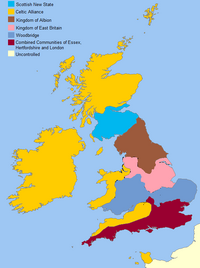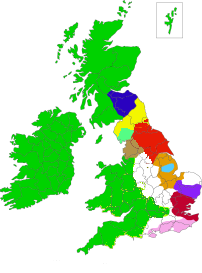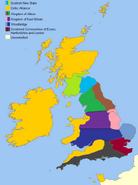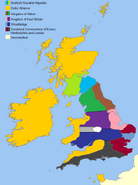| Organisation of British Nations | |
| 2008 – | |

| |
| Motto Against All Odds | |
| Anthem "Land of Hope and Glory" | |
|
The Organisation of British Nations as of 2010. | |
| Capital | Woodbridge |
| Foundation date | 22nd July 2008 |
| Official language | English (British (Cleveish, Lincolnshire dialect, Pitmatic, Northumbrian) and American), Hindi, Bengali, Chinese |
| State ideology | Parliamentary Democracy |
| Government | Political and economic union |
| Chairman |
Edward Poll |
| Area | |
| Population | 2,229,141 |
| Currency | various |
Introduction
The Organisation of British Nations (or OBN) was founded in 2008 by several small British survivor states who were, to varying degrees concerned about the amount of power and influence the Celtic Alliance had.
The founding nations were Woodbridge, Essex and Newolland (formally East Britain). There is also some discussion within Scotland about applying to join.
The OBN started out as a purely economic organisation given that the member states had good trade links with each other. However, there are now some political links in that the member states came to the conclusion that if would be better for them all if they spoke with one voice on the European and world stages. That having been said each member state is totally independent and there are absolutely no plans for the OBN to become a single nation
On September 1st 2010, it expanded for the first time, incorporating the nation of Southern England.
The Kingdoms of Cleveland and Northumbria both joined the OBN on the 14th November 2010.
With the naming of Edward John Poll as Chairman in 2017 began a period marked by even stronger expansionist policy and significant military intervention in crises in different member states, with the creation of an OBN army the same year to strengthen the organization's excellent peacekeeping measures and to intervene in any rebel or radical insurrections, to such a degree that Poll in many cases directly participated in armed confrontations leading the coalition forces against enemy groups (as he did in October 2019 during the Leicestershire crisis, personally leading the OBN into Loughborough to put down the separatist government installed there).
History
Original Proposal
The idea for a league of British survivor states to promote solidarity against the Celtic Alliance and New Britain has been floating around since at least the late 1990s, when British survivor states first began to come into contact with one another. However, no solid movements were made.
The first fully thought-out proposal for a group of cooperating nations came in March 2008 from Essex. Despite having achieved victory in a recent, large-scale war it was felt that the entire conflict could have been greatly shortened had nearby nations participated, chiefly Woodbridge with its air force. In order to dissuade future threats and to extinguish them faster Essex called for a unified military force from itself and its immediate neighbours, Woodbridge and East Britain. The proposal never gained the popularity it was expected to achieve - but it did fire the imagination of the Anglian states.
Not long after the proposal was shot down it was adapted by a group of traders who wished to establish a union between the three nations that would allow them to share their goods more safely and with fewer economic barriers. In this form the idea was much more popular; no one opposed the idea of the ability to share resources more freely, and thereby increase the quality of life in the region. On July 28th the organisation was officially inaugurated, its headquarters established in Woodbridge (given its relatively central location), and the first traders began to move.
Expansion
But it quickly became clear that the organisation could do so much more. By working together the three nations could greatly increase their efforts when it came to securing and repairing the countryside, and they could also be heard far louder on the European stage. The organisation's forum soon became host not to traders but to politicians and diplomats working together to ensure that their interests were met by the larger world.
In the meantime the new trading links allowed the discovery and cataloging of a number of tiny communities throughout East Anglia. Soon these communities were made regular stop-off points for traders and their knowledge of the local area and potential threats recorded. Of these potential threats it was recorded that a high amount of hostility existed in West Suffolk, which appeared to be occupied by a number of clans with racist leanings. Occasionally these clans would attack trader convoys or even make incursions into Essex and Woodbridge, though these were disregarded as the usual behaviour for clans in the British Wastelands.
From the start of 2010, though, these raids began to grow in intensity. Not wishing to lose valuable trade routes and well aware of a growing need to expand, Essex and Woodbridge agreed to invade the territories of West Suffolk in order to pacify the region and establish a codominion, whereby Essex and Woodbridge would contribute equally towards the redevelopment of the territory.
June 2010 - Month of War
Initially it was thought that the area could be captured fairly quickly and this reflected in the thinking of Essex and Woodbridge commanders as they placed troops on the frontline. Essex did not feel the need to call up its sizeable pool of reserves, and Woodbridge, though placing its entire tank and air forces in combat positions, stocked up only enough fuel for a week of combat. These underestimations of the enemy would soon show.
The Invasion of West Suffolk began on June 1st, the same day as Essex adopted the New Pound as its currency. (It was reasoned by Woodbridge commanders that any locals with radios would hear the news but assume that nothing else would happen on the day.) Ten thousand men from both armies attacked the district of St Edmundsbury, expecting a quick and easy victory. They were soon proved wrong - the resistance they encountered was determined, organized, and powerful. To Essex commanders it was no surprise when it was confirmed that the enemy clans were, in fact, a single force: the True British Army, thought defeated after the War of 2008. The ideas of a quick campaign soon languished as the war stretched out for over a fortnight, in the process seeing thousands of men on both sides die, particularly in costly battles for the towns of Haverhill and Newmarket, and treachery from clans occupying the northern area of the invasion zone.
When the designated territories were captured it was still not over. The newly acquired territories had no defensible land borders against future counterattacks. Important towns like Soham, Ely and the undamaged suburbs of Cambridge were still in the control of the True British Army and would represent bastions of resistance for years to come if not quickly dealt with. Reconvening, Essex, Woodbridge, and now East British commanders agreed a new phase of the invasion. Essex would push the lines towards the west bank of the River Great Ouse and capture the southern side of Cambridge, securing a land border for the new territories. Woodbridge would attack northward, driving along the Great Ouse northward, through Norfolk. East Britain would assault the Isle of Eels, securing the cathedral city of Ely and a slice of land between the Great Ouse and a pair of canals, then double-back to take King's Lynn at the coast.
The initial invasions proceeded swiftly. East British Royal Guardsmen proved adept at fighting the TBA on their own terms, being as well-versed in hand-to-hand combat and improvising weaponry as their opponents, and had captured Ely within two days. By the end of the month they had greatly expanded their own territory to include the Isle of Eels and King's Lynn, though were having slight difficulty in combating surviving TBA units scattered throughout their new territory. Woodbridge found its attacks easier, and exploited growing schisms between True British Army units in Norfolk to clear out their opposition and bring a quick victory. On June 27th the siege of Bury St Edmunds ended with a mass revolt from its civilian population. Support from hastily-redirected Woodbridge troops cleared out the True British Army garrison in the town and soon the area was inducted into the Essex-Woodbridge codominion.

The core states of the OBN, August 2010. Black: jointly occupied by Essex and Woodbridge; white: jointly occupied by Woodbridge and East Britain
For Essex the story was different. Though it soon captured its designated territories, it found its Hertfordshire territories the object of a vast counteroffensive by the TBA. Within three days the enemy had moved an estimated eight thousand men into the area. Though they were expelled in a day of good fortune on June 24th, they managed to ravage a noticeable part of Essex and as a result of their actions completely leveled the town of Saffron Walden. But after a crippling defeat of the TBA at Takeley, nearby former Stansted Airport, their entire invaded land was recaptured and much of their force destroyed. As a final recompense, special forces from Essex managed to track down the leader of the TBA - Colonel Isaac Lewis - who had led the invasion into Essex. Realising that killing the man would only make him a martyr to already-fanatical followers, they instead blinded the Colonel, destroying his troops' ideals of his invicibility and leading to his quick assassination, placing the remainder of the True British Army into a bloody civil war that would utterly destroy it by the start of August.
Despite the casualties of the invasions the benefits were immeasurable. The three nations of the OBN now had proper land borders and could move freely and safely between each other. Rather than having to make protracted journeys across the sea to reach ports in Essex and Woodbridge, freighters from Cleveland and Northumbria could unload at East Britain and see the goods quickly transported over the network of railways that was already in development by July. The heartland of the Organisation of British Nations was now totally secure and on its way to new heights.
Ascension
Soon after the wars, the OBN was looking at the serious prospect of growth. On July 18th Ray Mallon, Prime Minister of the Kingdom of Cleveland, announced that the country would hold a referendum over joining the OBN on October 22nd. This, combined with the abundant rumours in Northumbria that a similar referendum was in the works, meant that it was almost certain that the Organisation would soon be growing.
With the election of the Liberal Party in Southern England and their pledge to join the OBN work quickly began on the ceremony for Southern England's inclusion, a date set for late August or early September. These results were published on August 31st, and the following day OBN Chairman Simon Burns officially announced that Southern England was a part of the Organisation, to much applause and celebration in all nations involved.
In early August it was leaked that there were some plans for an invitation for King Andrew of New Britain to visit the OBN. This was later confirmed, and on the 14th of September the King arrived in Southern England on the first leg of what is said to be a busy (but confidential) schedule. With him were film crews from a handful of nations, as well as rapturous crowds waving the flags of the United Kingdom and the OBN. Andrew arrived a few hours behind schedule, but still had time to visit Chichester Cathedral and meet with Prime Minister Peter Brand, who would (along with a repertoire of dignitaries) accompany him overnight on the flagship hovercraft RNV Isle of Wight to Southend. He arrived in Southend, in Essex, early on the 15th.
The trip was a success, with all nations involved working tirelessly for a flawless visit. There were a few issues - for example, the train intended to carry the King across the Codominion of West Suffolk broke down, stranding the King and his entourage in the middle of the territory for several hours, and much of the King's stay in Essex was marred by heavy rainfall. Luckily, most of the rest of the tour went smoothly, culminating in the King's declaration to the OBN Council of Nations that "[his] nation's claim to name of 'Britain' seems weakened in the sight of the resolve and courage of the citizens who remained in the homeland".
On the 19th September 2010 King George of Northumbia announces by royal proclamation that Northumbria is seeking membership of the OBN. On the 22nd October 2010 the Kingdom of Cleveland held a referendum on seeking membership of the OBN, the vast majority of the votes were yes. Some analysts have suggested that the media cover provided by the King Andrew's visit were pull factors for votes, although pro-OBN sentiment in Cleveland was always high. The two nations officially joined the OBN on Sunday, November 14th.
22nd July 2008 - Foundation
- Woodbridge,
- Essex
- Newolland (formally East Britain).
1st September 2010
14th November 2010
Leadership of Edward Poll (2017 - present)

With the naming of Edward John Poll from Spalding as Chairman of the OBN in October 2017, the organization enacted an even stronger policy of expansion and military intervention, with the creation of an OBN army the same year to strengthen the organization's already excellent peacekeeping methods and to intervene in any rebel or radical insurrections, to such a degree that Poll in many cases directly participated in armed confrontations leading the coalition forces against enemy groups (as he did in October 2019 during the Leicestershire crisis, personally leading the OBN into Loughborough to put down the separatist government installed there).
Poll, a strong English nationalist, has on many occasions made reference to his vision of a future reunited England in his public speeches and reinforced the necessity for the member states of the OBN to continue to work together and stronger than before.
With the rise of shireism in different parts of Great Britain around the same time as the former Republic of Leicester, such as in rural Staffordshire and in Derbyshire, the OBN under Poll would start suffocating these separatist declarations employing militaristic measures.
"Imperātor Anglōrum" speech.
On the 1st February 2020, Edward Poll gave a speech at an OBN event insisting that they are the guides to a reunified England and that he is, quote unquote, "the Imperātor anglōrum who will lead the way"; the Latin term he used meaning "Emperor of the English". It is uncertain what he meant to say when he used this term. It is most likely that he was either simply referring to himself in a sophisticated manner as the guide to unity, or that he actually meant to say the word "Dux", another Latin word meaning guide or leader. However, a lot of people (including several newspapers across OBN member states) have interpreted this indirect usage of the word "emperor" as his attempt to proclaim himself monarch.
Organisation
Parliament
At the moment the OBN's parliament, or to give it it's official title the Council of Nations is a purely nominated body consisting of 5 politicians from each of the member nation. The Council meets once every 3 months in Woodbridge in order to discuss matters of shared interest whether they be economic, political or military. There are some politicians who believe that the Council should eventually become an elective body in order to give it's decisions more legitimacy. The drive for more democracy within the Council has been given added impetus by the expansion of the OBN to seven nations with the accession of Cleveland, Northumbria and the Duchy of Lancaster in late 2010
Dedicated branches
Expansion committee
East British politicians have drawn a series of maps showing the known nations of Britain and showing possibilities for future expansion. The expansion zones are made for expansion but if a functioning nation-state is found a plebiscite should be held. The plebiscite would go as follows: Would you prefer:
- 1) Full annexation by [insert name as applicable].
- 2) Split annexation along the set expansion zone lines.
- 3) Independence.
For example

In 2009 there was some uproar over these maps. The longitudinal lines of expansion were opposed by some who wish for England to remain mapped by its old county-based boundaries rather than 'colonial-style' squares and rectangles. Essex delegates were renowned for the stubbornness in this respect, with all of their delegates firmly entrenched with the view that expansion should be haphazard and organic. Their common explanation for this was that they wish to preserve British heritage in spite of 'inconveniences', and backed this up by pointing out that the OBN itself is an organisation to preserve British culture in the face of the Celtic Alliance and New Britain. Extreme interpretations of this suggested that these delegates considered it their duty to protect old boundaries rather than divide the countryside into grids.
East British cartographers pointed out that their maps were 'guidelines' and 'strictly provisional'. The grid lines were just an idea. They have, however, released a new map in the same style of previous issues, but this time detailing the expansion zones with county borders.
Following the June 2010 invasions some have noted that expansion is more likely to be based upon annexing districts rather than entire counties, and often influenced by the lay of the land - such as rivers, hills, and roads.
Electoral Observation Committee
In August of 2010 East Britain held it's first General Election and the government invited electoral observers from Woodbridge and Essex to observe that the election was conducted in manner that was fair and above board. The observers worked well and Woodbridge decided to ask the other two OBN members to return the favour for it's next election that would be taking place in 2011. It was then decided to set up the Electoral Observation Committee which would consist of independent observers from each member state. The attendance of the observers at an election can be requested in two ways
- The government of a member state can ask for observers to be present at a election
- A sufficiently large percentage of the population of a member state can sign a petition asking for the presence of the observers
Documentation Board
This board is a branch of the OBN dedicated to retrieving and preserving as much of the surviving pre-Doomsday British culture as possible. Its mandate includes almost anything of significance; books, from diaries to Dickens; videotapes; records; indeed, almost anything that can offer insights into old culture. This board has also organised several missions to old schools, colleges, universities and museums, and is hoping to secure funding for a convoy into Oxford and Cambridge. It hopes to construct a number of new museums throughout member nations to store, study and display these gathered relics.
As well as preserving the past the Documentation Board also serves to record current affairs within the member nations. It has a number of scribes working with local newspapers to keep detailed and balanced views of local events, as well as collecting oral histories. Several Essex and Woodbridge radio stations have backups of their tapes stored by the Board in various fireproofed warehouses.
The Documentation Board works closely with the British Survivors Administration when it comes to retrieving artifacts, and unlike the Celtic Alliance freely allows most artifacts retrieved with BSA cooperation to be shipped to New Britain.
Military
The OBN has had a unified military task force since 2017, having been officially established by chairman Edward Poll as part of his reformations, an announcement which was praised by Essex, which of the member nations was the one that pushed the strongest for a collective military force made up of forces from member states. Its equipment is quite modern, as the equipment of the Royal Guardsmen had been improving significantly in the years building up to the creation of this united task force.
The Organisation has also proven to be a facilitator of easier communication between the armed forces of member states, allowing joint operations to be planned more easily.
The OBN has assisted in the Ur Alba War and the Great Rutland War, as well as helping with the Lincolnshire Assimilation Project






